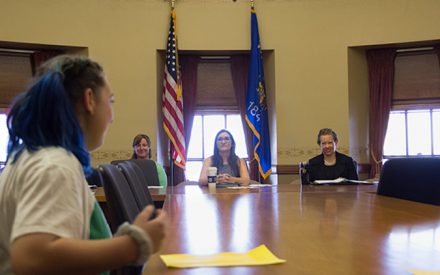Parental incarceration is an adverse childhood experience that affects many Wisconsin households, with more than 100,500 individuals under correctional supervision and people of color being disproportionately affected. About 88,000 children in Wisconsin have or have had a parent in jail or prison during their childhood. This is harmful to children’s development and can create near-term issues like increased risk of poor academic outcomes and behavior problems as well as long-term issues like poor adaptation to stress, poor social functioning, physical and behavioral health problems, financial problems, and even early death. Parental incarceration also has negative consequences for the broader family system by frequently reducing incarcerated fathers’ engagement in parenting and negatively impacting caregivers’ mental health and well-being.
Through Extension’s Literacy Link program, families impacted by incarceration and involvement with the justice system are better able to build and maintain strong relationships while engaging in literacy-enhancing activities. These relationships and learning opportunities can help offset the damaging impacts of childhood adversity, helping children thrive in their families and communities. The goal of the program is to foster strong, responsive relationships between children and their caregivers that can help buffer against the negative impacts of childhood adversity and stress. Extension moves beyond a system that typically targets families through parent education and youth mentoring programs and employs a dual generation strategy that provides opportunities for parent-child connection while the parent is incarcerated or on parole or probation.
Prior to the COVID-19 pandemic, over 2,000 high-quality books were distributed to justice spaces across the state in early 2020. Through efforts like “Making Reading Memories” 123 parents across five counties were recorded reading storybooks, and 204 children were sent recorded videos and books. Nearly all caregivers (90%) who participated in a follow-up evaluation agreed that this intervention helped maintain the connection between their children and the incarcerated parent, and over half of caregivers (57%) reported reading to their children more often.
Extension educators have reimagined waiting and visitation areas in jails, courts and other justice spaces to offer literacy-rich experiences for children. In addition, they have delivered workshops for incarcerated parents to build their interactive reading skills, which in turn promote positive parent-child relationships.
Due to COVID-19, many local jails restricted access of visitors and external partners, including Extension educators. In response to justice-involved families’ unique challenges during the pandemic, Extension Educators developed and distributed 343 Family Literacy Kits to children previously enrolled in Literacy Link strategies. The kits contained books, letter-writing materials and other literacy resources.
Extension programs promote positive, literacy-based interactions between young children and their justice-involved parents and caregivers.
The Literacy Link program is part of Extension’s Human Development & Relationships Institute. Learn more by visiting extension.wisc.edu/family.
Download Article

 The Path to Stable Housing
The Path to Stable Housing Supporting Adults Who Experience Isolation
Supporting Adults Who Experience Isolation Supporting Children, Parents and Caregivers During Family Transitions
Supporting Children, Parents and Caregivers During Family Transitions Youth in Governance
Youth in Governance


